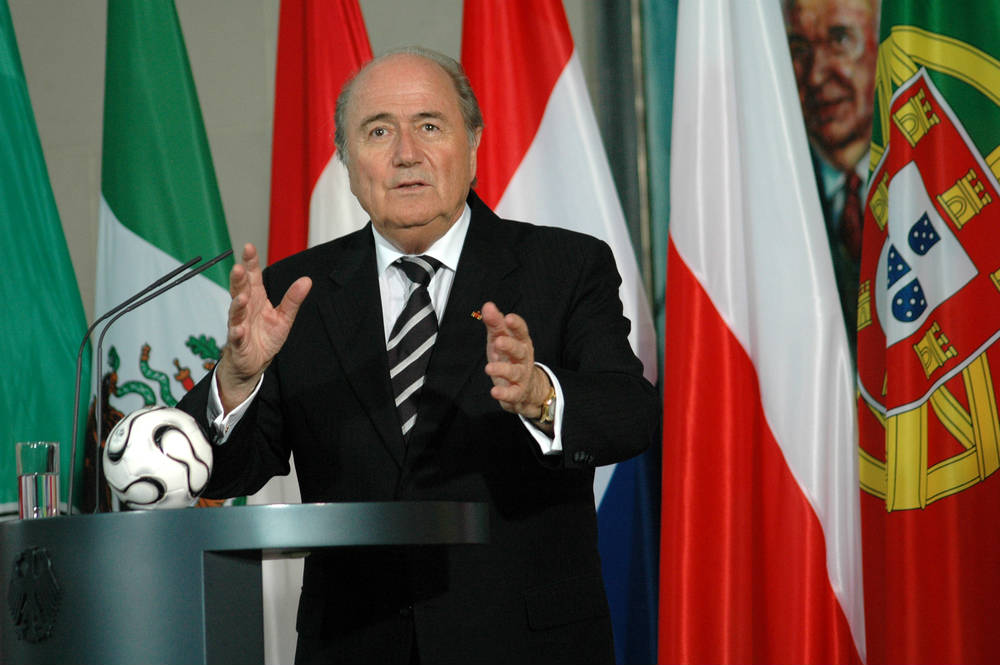A Jordanian prince has stepped up to challenge four-time FIFA President Sepp Blatter. Who will emerge victorious?
The announcement by FIFA Vice President Prince Ali Bin al-Hussein that he will challenge the world soccer body’s four-time president, Sepp Blatter, in elections later this year has turned the poll into a battle for the group’s future. A vote for the Jordanian prince is at least a vote against the FIFA president, following multiple corruption scandals, and more likely a vote for change.
With his announcement following months of canvassing of FIFA members to assess his chances of winning an uphill battle, Prince Ali has positioned himself as Blatter’s foremost challenger. And that is where the problems start. Former French diplomat and FIFA executive Jérôme Champagne — like Prince Ali, a reformer — has already declared himself a candidate, while ex-Chilean football association President Harold Maynes-Nicholls, another proponent of change, is believed to be considering putting himself forward. A four-candidate battle risks Blatter benefitting from the reformist vote being split among his three opponents.
During his four years as FIFA vice president and membership of the executive committee of the Asian Football Confederation (AFC), Prince Ali has built a track record of achieving reform, with his successful bid to change soccer rules to allow female Muslim players to wear a culturally acceptable headdress that meets safety and security standards; a resolution by the 13-member West Asian Football Federation that groups Middle Eastern soccer associations to put a woman’s right to play on par with that of a man; his ability to pick his battles and forge alliances; his emphasis on grassroots football through the Asian Football Development Project (AFDP); the introduction of corporate social responsibility into deliberations between business and soccer in the Middle East; and his stand against corruption and in favor of greater transparency and accountability.
In doing so, Prince Ali has made both friends and enemies. The difficulties he is likely to face in the upcoming electoral battle were evident at the AFC congress in Sao Paulo on the eve of the 2014 World Cup. The congress voted in favor of a proposal by AFC President Sheikh Salman bin Ebrahim al-Khalifa to automatically make the AFC president the FIFA vice president. The decision effectively terminated Prince Ali’s position as elected vice president when his term ends later this year. The congress voted in favor of Sheikh Salman’s proposal, even though it had earlier rejected the notion.
While Prince Ali was key in creating the basis of the banning for life from involvement in professional soccer of former FIFA executive committee member and AFC President Mohammed Bin Hammam, he failed in getting the Asian group to act on recommendations of an internal audit conducted by PricewaterhouseCoopers (PwC) to possibly file criminal and civil charges against the disgraced official and renegotiate, if not cancel, the AFC’s $1 billion master rights agreement with Singapore-based World Sports Group. The burial of the audit by Bin Hammam’s successor, Sheikh Salman, serves as another indicator of resistance to change within Asian and world soccer governance.
Prince Ali is likely to be able to count on the support of a majority of members of UEFA, the European soccer body, whom he enlisted to help the AFC streamline some of its operations, as well as reformist segments of Asia, including Japan, South Korea, Australia and Singapore. He is further well-positioned to garner support from the United States and a number of other associations in the Americas. The Middle East and North Africa are likely to split their vote between Blatter and Prince Ali, with a number of autocrats favoring the status quo. Prince Ali potentially will enjoy support from FIFA sponsors, who worry that Blatter and FIFA’s sullied image could reflect badly on them. Emirates, the airline, and Sony have already announced that they were ending their sponsorship agreements with FIFA.
For the Sake of Soccer
At age 39, Prince Ali is the youngest serving official on FIFA’s executive committee. A half-brother of Jordanian King Hussein and a brigadier general in the Jordanian military with a long-standing passion for soccer for the sake of soccer, Prince Ali has been involved in the game since his twenties when he became president of the Jordanian Football Association, which he has turned into a model for associations elsewhere in the region. Fluent in Arabic, English and various Circassian languages, he has also demonstrated sensitivity to minorities in a region that has become increasingly intolerant of the other.
Prince Ali’s announcement of his candidacy, a reflection of his personality and approach, suggests what his emphasis is likely to be should he win the election. He said he had decided to run because the time had come to “shift the focus away from administrative controversy and back to sport” — a reflection of his emphasis on soccer rather than on the power that comes with high office in FIFA. Prince Ali said his vision of FIFA was one of a “service organization and a model of ethics, transparency and good governance.”
Like Champagne, who welcomed electoral debate with Prince Ali, the Jordanian said his campaign would be “focused on ideas to strengthen and improve FIFA. The headlines should be about football, not about FIFA.”
It is hard to take issue with Prince Ali’s vision and track record. He is, however, likely to discover that electoral victory does not automatically open the door to reform. No doubt, Prince Ali would bring a different tone and style to FIFA and a renewed emphasis on the game rather than exclusively on the business of the sport. But it will take all his communication and negotiation skills to counter vested interests in world soccer governance.
If there is one area where Prince Ali may tread cautiously, that is the incestuous relationship between sports and politics that is nowhere more prevalent than in the Middle East and North Africa. Nonetheless, insistence on adherence to FIFA rules and regulations by national associations would go a long way in reducing political abuse of the sport. Inevitably, that insistence will have to be part of any effort to ensure transparency and accountability within FIFA.
James M. Dorsey is a senior fellow at the S. Rajaratnam School of International Studies as Nanyang Technological University in Singapore, co-director of the Institute of Fan Culture of the University of Würzburg and the author of the blog, The Turbulent World of Middle East Soccer, and a forthcoming book with the same title.
Fair Observer is a nonprofit organization dedicated to informing and educating global citizens about the critical issues of our time. Please donate to keep us going.
The views expressed in this article are the author’s own and do not necessarily reflect Fair Observer’s editorial policy.
Photo Credit: Antonio Scorza / 360b / Shutterstock.com
Support Fair Observer
We rely on your support for our independence, diversity and quality.
For more than 10 years, Fair Observer has been free, fair and independent. No billionaire owns us, no advertisers control us. We are a reader-supported nonprofit. Unlike many other publications, we keep our content free for readers regardless of where they live or whether they can afford to pay. We have no paywalls and no ads.
In the post-truth era of fake news, echo chambers and filter bubbles, we publish a plurality of perspectives from around the world. Anyone can publish with us, but everyone goes through a rigorous editorial process. So, you get fact-checked, well-reasoned content instead of noise.
We publish 2,500+ voices from 90+ countries. We also conduct education and training programs
on subjects ranging from digital media and journalism to writing and critical thinking. This
doesn’t come cheap. Servers, editors, trainers and web developers cost
money.
Please consider supporting us on a regular basis as a recurring donor or a
sustaining member.
Will you support FO’s journalism?
We rely on your support for our independence, diversity and quality.










Comment